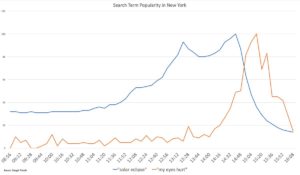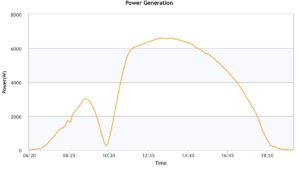August 23, 2017
Briefly
- On Thursday 7 September, 3pm, in Auckland, “The Future of Open Data in Aotearoa”, featuring Ed Corkery (CEO of Koordinates), Harkanwal Singh (Data Editor, NZ Herald) and Liz MacPherson (Government Statistician)
- “The flip side of personal genomics: When a mutation doesn’t spell disease” from Nature News
- “Is it fair to say that most social programmes don’t work?” (yes, but some do)
- “Dramatic treatment effects are rare” from the blog students4bestevidence
- Another story about machines learning stereotypes, this time in image recognition.
- Peter Griffin on an example of science news hype attributable to the research institution
- Peter Ellis has a nice pointy-clicky tool summarising the 2014 NZ Electoral Study (who voted for whom)
- A couple of eclipse graphs:
From reddit user superpaow

and from Noah Illinsky

Thomas Lumley (@tslumley) is Professor of Biostatistics at the University of Auckland. His research interests include semiparametric models, survey sampling, statistical computing, foundations of statistics, and whatever methodological problems his medical collaborators come up with. He also blogs at Biased and Inefficient See all posts by Thomas Lumley »
It’s more like “most social programmes that need to be tested with a RCT to discover if they have an effect don’t work”.
The point being that the obvious treatments are already in place and didn’t need RCTs to discover their merit. They’ve become so standard and engrained that noone actually perceives them as treatments.
For example, in the medical sphere – if you are sick, go to the doctor. Going to the doctor is the treatment but it’s so standard nowadays that virtually noone would consider doing it as a RCT.
Basically, after a few millenia, we’ve got the low hanging fruit by trial and error.
8 years ago
That’s the optimistic view. On the other hand, you could imagine people saying that about leeches or enforced bed rest or punitive drug laws.
8 years ago
But leeches, some enforced bedrest (e.g. after back operations) and punitive drug laws are known now to have bad outcomes on average.
In some cases, the social programmes are not the best treatments but the best given idealogical beliefs and legal knots.
Rather than say the laws are wrong or the ideology is wrong, they say social programmes don’t work.
8 years ago
Heres some nifty details with zoomable maps of total solar eclipses for NZ and Australia coming up this century.
The North Island gets a double : in both 2037 and 2038
http://moonblink.info/Eclipse/when/oz
8 years ago